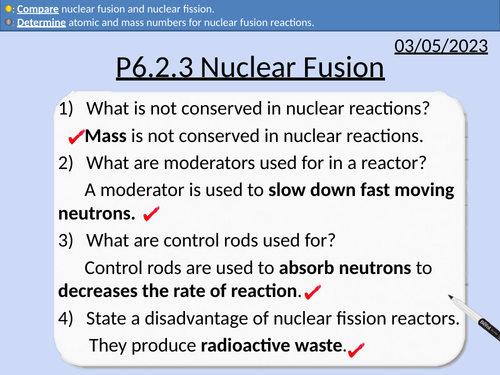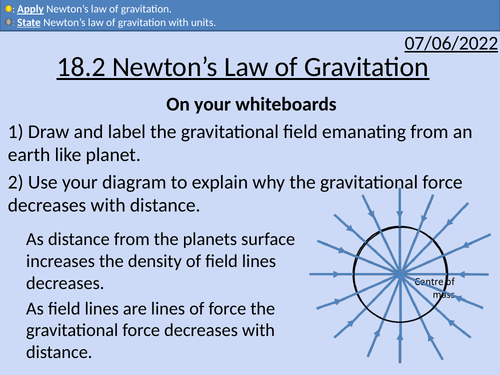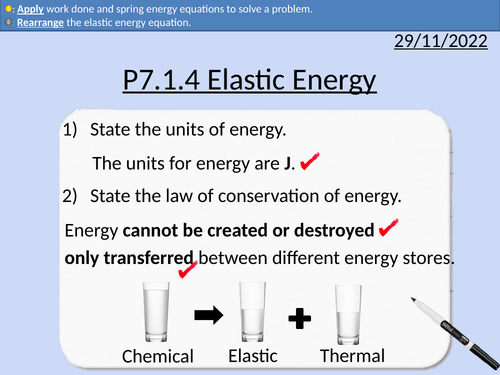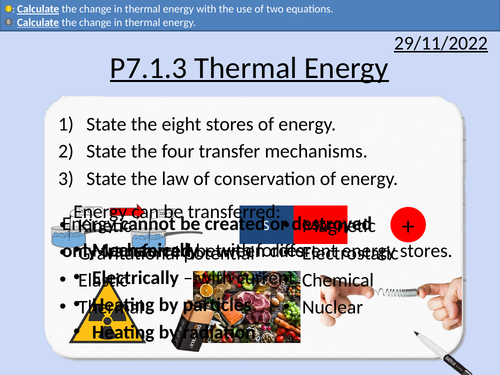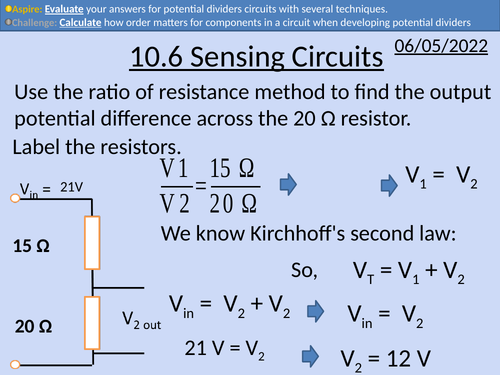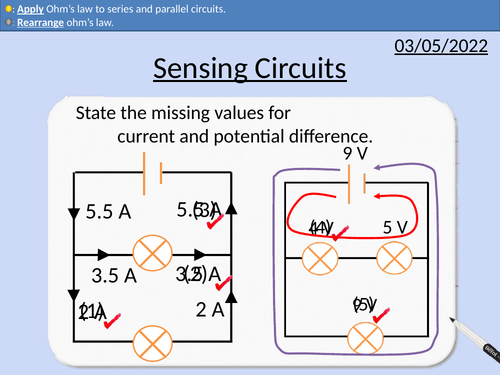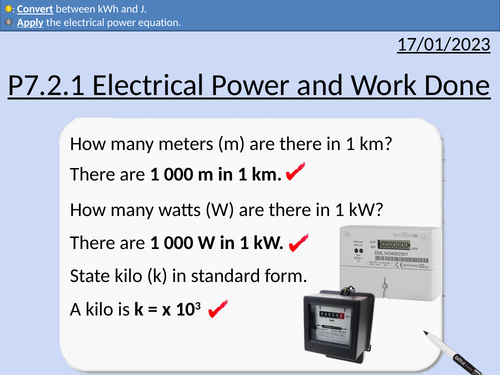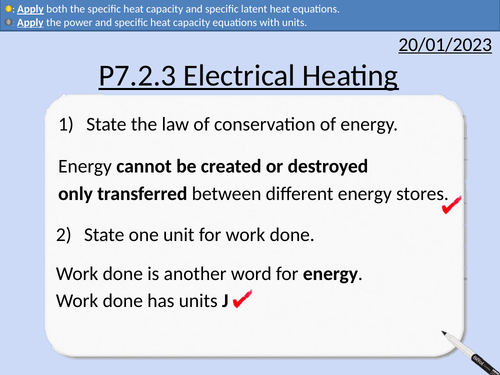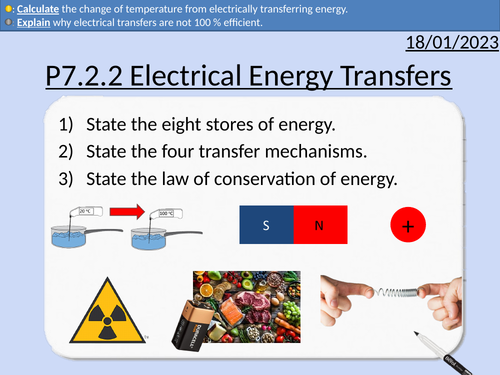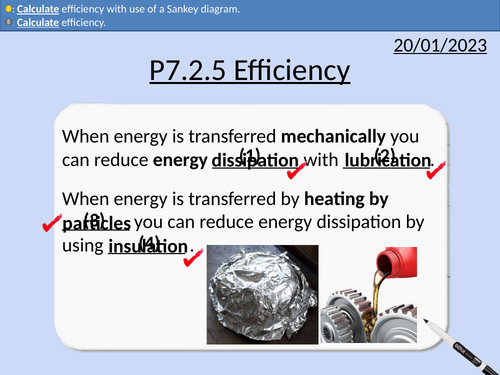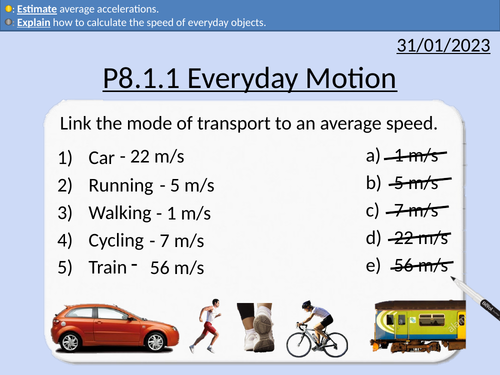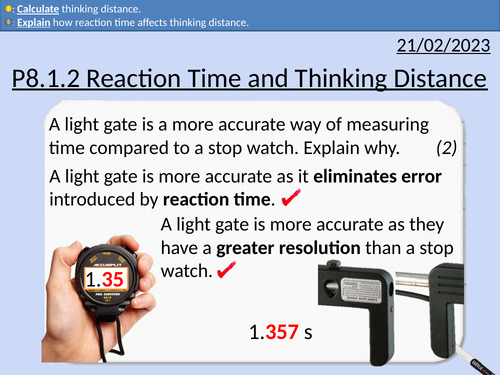500Uploads
172k+Views
73k+Downloads
Physics

GCSE Physics: Electromagnetic Waves
These presentations cover the OCR Gateway Physics 9-1 P5.2.1 Electromagnetic Waves. Includes student activities and full worked answers.
Order of the electromagnetic spectrum
Wavelength and frequency relationship
Application of wave speed equation
Rearranging equation
Producing and detecting radio waves

GCSE Physics: Nuclear Fusion
This presentation covers OCR Gateway Physics 9-1 P6.2.3 Nuclear Fusion
This PowerPoint is a whole lessons included with student activities and animated answers.
Mass and energy equivalence
Nuclear fusion conditions
Fuel for nuclear fusion
Benefits of nuclear fusion
Nuclear equations
Comparing nuclear fusion and fission
Bundle

OCR A level Physics: Ideal Gas
OCR A level Physics: Ideal Gas is a part of the Module 5: Newtonian World and Astrophysics.
All presentations come with worked examples, solutions and homeworks.

OCR A Level Physics: Newton's Law of Gravitation
OCR A Level Physics:Newton’s Law of Gravitation presentation, homework and answers.

GCSE Physics: Kinetic energy and Work done
This presentation covers OCR Gateway Physics 9-1 P7.1.1b Kinetic energy and Work done.
PowerPoint includes student activities with fully worked answers included.
Work done and kinetic energy equations
Rearranging equations
Mechanical energy transfer and work done
Kinetic store transfered mechanically to a thermal store through brakes.

GCSE Physics: Work Done and Elastic Energy
This presentation covers OCR Gateway Physics 9-1 P7.1.4 Work Done and Spring Energy.
Use of Springs
Measuring Extension of a Spring
Rearranging Spring Energy Equation
Rearranging Kinetic Energy Equation
Practice Questions with Worked Solutions
Bundle

GCSE OCR Physics: P7.1 Energy and Forces
All resources for P7.1 Work Done GCSE OCR Physics Gateway 9-1. Triple and combined (Higher and Foundation) is covered in this material.
Energy Stores and Energy Transfers
Work Done and Kinetic Energy
Work Done, Kinetic Energy and Thermal Energy
Work Done and Spring Energy
Gravitational Energy
Kinetic Energy
Kinetic and Gravitational Energy
Gravitational and Spring Energy
Gravitational Force and Energy
Bundle

GCSE OCR Physics: P6 Radiation
All resources for GCSE OCR Physics Gateway 9-1 P6 Radiation.
Triple and combined (Higher and Foundation) is covered in this material.
Atoms and Isotopes
Alpha, Beta, and Gamma Radiation
Nuclear Equations
Half-life
Radiation and the body
Nuclear Fusion
Nuclear Fission
Radiation in and out of atoms

GCSE Physics: Gravitational and Elastic Energy
This presentation covers OCR Gateway Physics 9-1 P7.1.7 Gravitational and Elastic Energy
Energy transfers with links to sport and PE.
Employer-mentor links with physics and sports
Exam Style Question with worked solutions
Rearranging equations
Practice Questions with worked solutions

GCSE Physics: Work Done, Kinetic and Thermal Energy
This presentation covers OCR Gateway Physics 9-1 P7.1.3 Work Done, Kinetic and Thermal Energy
Comes complete with students activities and fully worked solutions.
Energy transfers to thermal store.
Thermal energy, equation, and specific heat capacity.
Work done equation and kinetic energy equation.
Rearranging equations.
Applying equations.
Student questions with fully worked solutions.

GCSE Physics: Gravitational Energy
This presentation covers OCR Gateway Physics 9-1 P7.1.5 Gravitational Energy
Gravitational fields
Rearranging Gravitational Energy Equation
Exam question with worked solutions
Practice questions with worked solutions
Analysing graphs and gradients.

OCR AS Physics: Sensing Circuits
OCR AS Physics: Analysing Circuits is a part of the Module 4: Electrons, Waves, and Photons. PowerPoint with worked examples and homework.
Kirchhoff’s Laws for potential difference
Thermistors and LDRs in sensing circuits
Ratio of resistances and ratio of potential differences

GCSE Physics: Sensing Circuits
This presentation covers OCR Gateway Physics 9-1 P3.2.7 Sensing Circuits
Potential difference in series and parallel circuits
Lamps in series and parallel
Gravitational potential and potential difference
LDR and Thermistor in potential divider circuits
Using LDRs to control security lights
Using thermistors to control heating/cooling circuits
Exam questions with worked solutions

GCSE Physics: Electrical Power and Work Done
This presentation covers OCR Gateway Physics 9-1 P7.2.1 Electrical Power and Work Done. All presentations come with student activities and worked solutions.
Definition of power
Converting between W and kW
Converting between seconds, minutes, and hours
Calculating work done in kWh and J
Converting between kWh and J
Bundle

GCSE OCR Physics: P7.2 Power and Efficiency
All resources for P7.2 P7.2 Power and Efficiency GCSE OCR Physics Gateway 9-1. Triple and combined (Higher and Foundation) is covered in this material.
All powerpoints include student activities and worked examples.
Electrical Work Done
Paying for Electricity
Electrical Energy Transfers
Electrical Heating
Thermal Conductivity
Efficiency and Sankey Diagrams

GCSE Physics: Electrical Heating
This presentation covers OCR Gateway Physics 9-1 P7.2.3 Electrical Heating Transfers. All presentations come with student activities and worked solutions.
Walls and Insulation
Thermal energy dissipation
Reducing thermal energy dissipation with lubrication and insulation
Heating substances and state changes
Work done = Power x Time
Change in thermal energy = Mass x Specific Heat Capacity x Change in temperature
Thermal energy for state change = Mass x Specific latent heat

GCSE Physics: Electrical Energy Transfers
This presentation covers OCR Gateway Physics 9-1 P7.2.2 Electrical Energy Transfers. All presentations come with student activities and worked solutions.
Energy stores
Energy transfers
Current heats wires
Wasted energy in motors and heating elements
Specific heat capacity and electrical energy
Thermal energy = Mass x Specific Heat Capacity x Change in Temperature
Energy = Charge x Potential Difference

GCSE Physics: Efficiency
This presentation covers OCR Gateway Physics 9-1 P7.2.5 Efficiency.
All presentations come with student activities and worked solutions.
Efficiency Ratings
Improving efficiency with insulation and lubrication
Maximum efficiency
Efficiency equation
Sankey diagrams

GCSE Physics: Everyday Motion
This presentation covers OCR Gateway Physics 9-1 P8.1.1 Everyday Motion. All presentations come with student activities and worked solutions.
Average speeds of walking, running, cycling, cars, trains, wind, sound, and light.
The speed equation
The acceleration equation
Explaining average speed camera
Explaining instantaneous speed camera
Estimating everyday accelerations
Calculating speed from rotation speed and circumference of wheels
Converting from miles per hour to meters per second

GCSE Physics: Reaction Time and Thinking Distance
This presentation covers OCR Gateway Physics 9-1 P8.1.2 Reaction Time and Thinking Distance. All presentations come with student activities and worked solutions.
Reaction time definition
Factors that increase reaction time
Simple reaction time experiment
Thinking distance
Rearranging equations
Speed equation
(Final velocity)2 – (Initial velocity)2 = 2 x Acceleration x Distance
v2 – u2 = 2 a s


